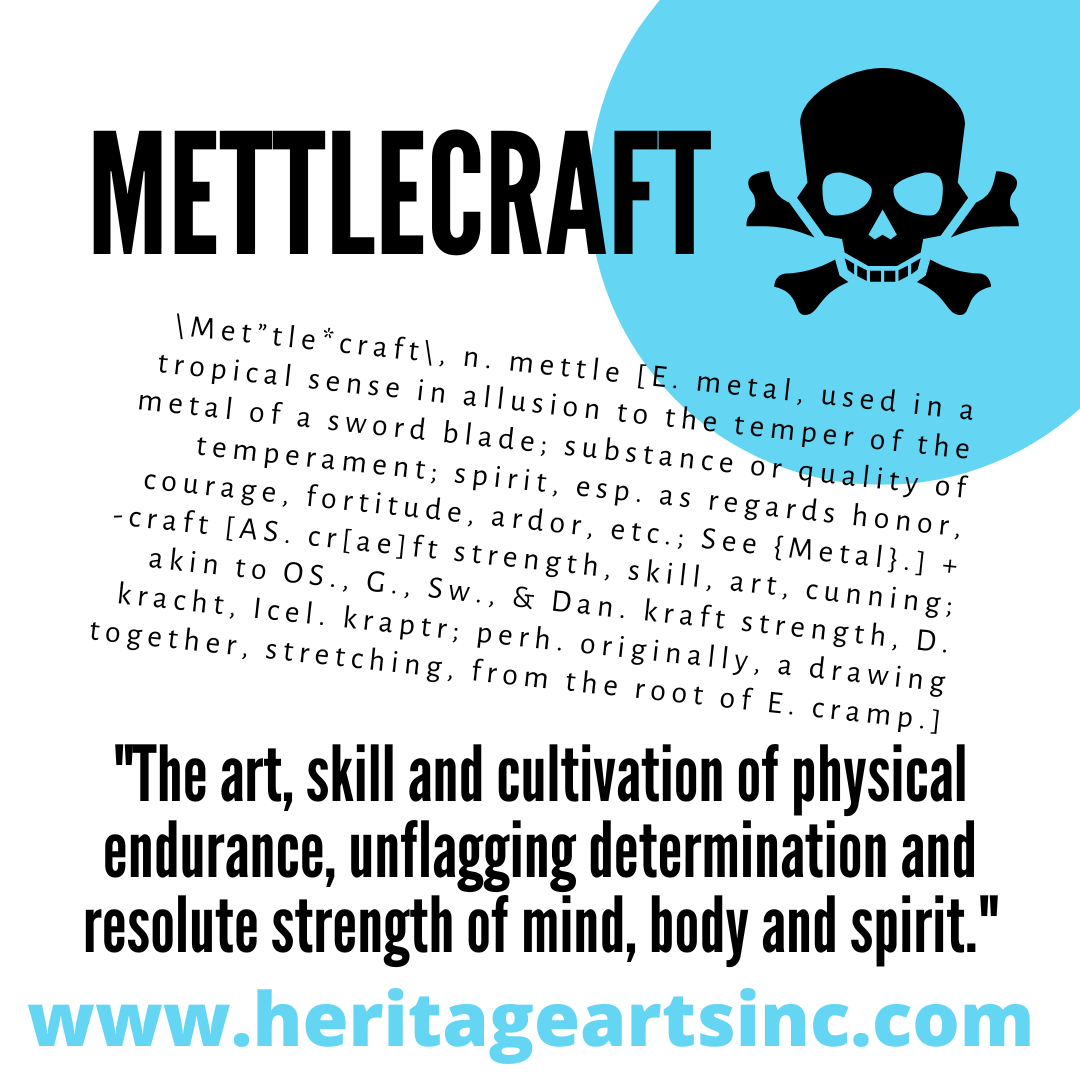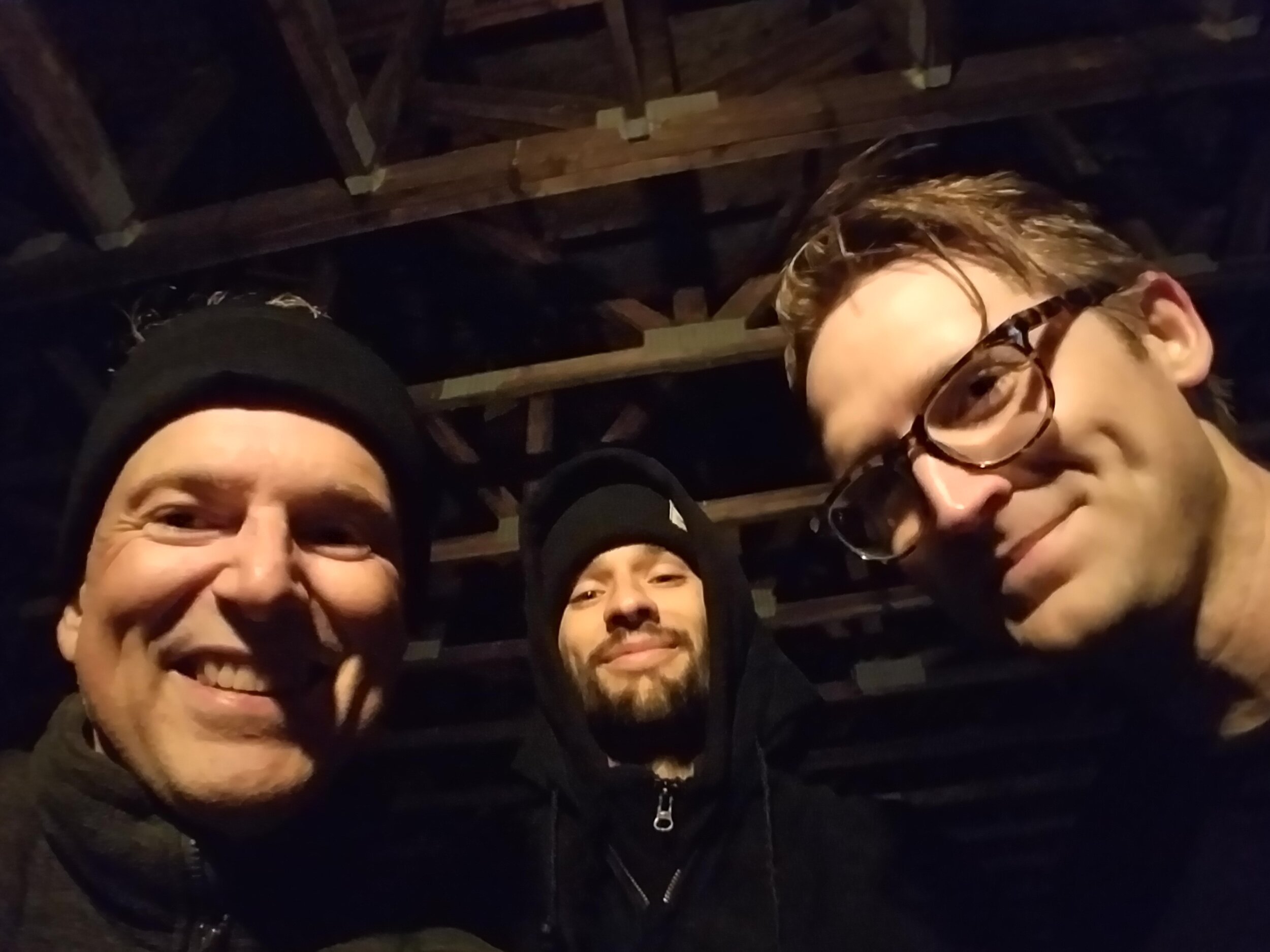Introduction to 7th Annual Mettlecraft Month 2024
It’s November and Mettlecraft Month is here! This month we’re going to be exploring self-defense readiness by facing a number of interesting physical, mental, and spiritual tests — some of which will require homework. Seven new challenges each and every week! Can you carry an injured buddy 100 yards? How’s your pain tolerance? Can you perform a ranger roll? You won’t believe what we have in store for you this year!
What is mettlecraft? Mettlecraft is the cultivation of fighting aspect, physical endurance, unflagging determination, and resolute strength of body, mind and spirit. In short, it is the relentless pursuit of indomitability, the fourth virtue of Heritage Self-Defense. It’s a mash-up of two words used in the old-time way:
\Met"tle\, n. [E. metal, used in a tropical sense in allusion to the temper of the metal of a sword blade. See {Metal}.] Substance or quality of temperament; spirit, esp. as regards honor, courage, fortitude, ardor, etc.
\Craft\ (kr[.a]ft), n. [AS. cr[ae]ft strength, skill, art, cunning; akin to OS., G., Sw., & Dan. kraft strength, D. kracht, Icel. kraptr; perh. originally, a drawing together, stretching, from the root of E. cramp.] 1. Strength; might; secret power. [Obs.]
Recaps of Previous Mettlecraft Months
6th Annual Mettlecraft Month 2023
5th Annual Mettlecraft Month 2022
4th Annual Mettlecraft Month 2021
3rd Annual Mettlecraft Month 2020
Homily for All Saints’ Day, 11/1/24 – Father Mitch Mitch
Readings: Rv 7:2-4, 9-14, Ps 24:1bc-2, 3-4ab, 5-6, 1 Jn 3:1-3, Mt 5:1-12a
Mark 10:46-52 World English Bible
1 Seeing the multitudes, he went up onto the mountain. When he had sat down, his disciples came to him. 2 He opened his mouth and taught them, saying,
3 “Blessed are the poor in spirit,
for theirs is the Kingdom of Heaven.*
4 Blessed are those who mourn,
for they shall be comforted.*
5 Blessed are the gentle,
for they shall inherit the earth.†*
6 Blessed are those who hunger and thirst for righteousness,
for they shall be filled.
7 Blessed are the merciful,
for they shall obtain mercy.
8 Blessed are the pure in heart,
for they shall see God.
9 Blessed are the peacemakers,
for they shall be called children of God.
10 Blessed are those who have been persecuted for righteousness’ sake,
for theirs is the Kingdom of Heaven.
11 “Blessed are you when people reproach you, persecute you, and say all kinds of evil against you falsely, for my sake. 12 Rejoice, and be exceedingly glad, for great is your reward in heaven.
The modern world, and the United States especially, has lost touch with the saints. Whose fault is that? Well, it’s our fault of course. We do not talk about them. We do not refute the falsehoods that this culture propagates concerning them. We dodge our responsibility to stand up for them.
They say that all Christians are saints, and none deserve holidays. But do all Christians volunteer to die in the place of another as St. Maximilian Kolbe did? Do all Christians spend their lives in the dirtiest hell-holes on earth, ministering to the sick, the homeless and the destitute as St. Teresa of Calcutta did?
They say that we worship the saints. But it would be more accurate to say, “No, this culture worships politicians, sports figures, money, fame, sex and power while humble Christians seek to emulate the selfless behaviors of the saints.” Saints like the teenage princess St. Catherine, who could’ve lived a comfortable and easy existence, but chose instead to denounce the cruelties of Emperor Maxentius and was beheaded for her courage. Or St. Francis, the rich and youthful soldier who renounced his money and fame to become a wandering monk and preacher, living a life of radical poverty and almsgiving, ultimately dying penniless and blind.
They say the miracles performed by the saints are absurd. And yet the standards by which sainthood is conferred are so restrictive, and require so much certification, that it can take centuries for investigations to be completed – investigations that require scientific evidence, eyewitness testimony, and formal review by dozens of councils and other ecclesiastical authorities. If we can agree that courts of law can arrive at the truth thousands of times a day all across our great country, we should be able to agree that ecclesiastical courts can certify the truth of saintly miracles.
But when all is said and done, all of this back-and-forth about the validity of saints – their reverence, their miracles, and all of that – is wide of the mark. That is not why we celebrate All Saints Day.
Saints matter deeply, and this holiday is so important, because saints demonstrate what it looks like when Christians truly attempt to live the precepts that Christ lays out in Matthew 5, our gospel reading for today. As Chesterton said, “The Christian ideal has not been tried and found wanting. It has been found difficult; and left untried.” Saints somehow manage to prove both the truth and falsehood contained in Chesterton’s remark. Most Christians haven’t tried, true enough; but the saints have indeed, and their lives are proof of the results.
As St. Gregory the Wonder Worker said in his famous homily called “On All the Saints,” the saints have “shown their power, leaping with joy in the presence of death, laughing at the sword, making sport of the wrath of princes, grasping at death as the producer of deathlessness, making victory their own by their fall, through the body taking their leap to heaven, suffering their members to be scattered abroad in order that they might hold their souls, and, bursting the bars of life, that they might open the gates of heaven.”
* 5:3 Isaiah 57:15; 66:2
* 5:4 Isaiah 61:2; 66:10,13
† 5:5 or, land.
* 5:5 Psalms 37:11





